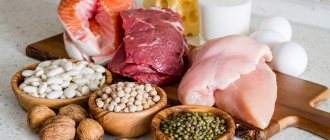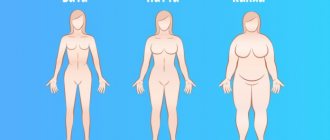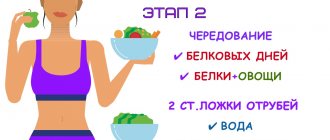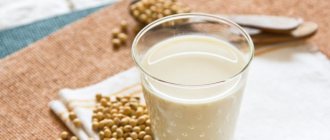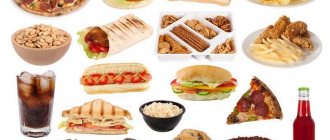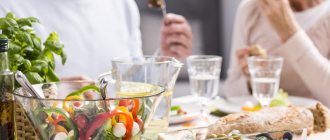All about obesity
On a note
Obesity is the excess accumulation of fat in the body, which leads to changes in metabolism and organ function.
Diabetes mellitus, hypertension, cardiovascular pathologies are direct consequences of excess weight.
To determine the degree of obesity, body mass index is calculated. An index of 18 to 25 kg/m² is considered the norm.
- If the BMI is from 30 to 35, it is the first degree of obesity.
- With a BMI from 35 to 40 - second degree.
- With a BMI over 40 - third and fourth degree.
Many diets have been developed to treat obese patients. Before changing your diet, consult your doctor and figure out what caused your excess weight.
Basic recommendations for dieting
Following any “newfangled” diet does not mean that you will necessarily achieve effective results. The so-called “mono-diets”, the essence of which is the use of one food product, must be justified.
Important! You can follow a “mono-diet” only if you need to lose everything in a short time. Restriction in a varied diet and concentration on one product for a month or more can disrupt the proper functioning of the body and metabolism.
The best diet option is a diet consisting of a large number of foods. This is necessary for the body to receive all useful proteins and carbohydrates.
A big plus when following a proper diet will be the ability to cook and combine incongruous foods. Contrary to many opinions that diets are based only on tasteless foods, “Eat and Lose Weight” is quite thoughtful in terms of product composition. Fruits, vegetables, nuts, meat, eggs, cereals, dairy products and even chocolate are all allowed, subject to a balanced diet. In a situation with compliance with the requirements “Eat and lose weight,” the saying “A little bit of everything” works perfectly.
Eliminating overeating, avoiding unhealthy fast food, salt and fatty foods, physical activity and plenty of fluids are sure to lead to weight loss.
Principles of diet for obesity
- Gradually and consistently reduce the number of calories you consume. On average, the daily caloric intake will have to be reduced by 500-1000 kcal.
- Control the balance of the BZHU. Try to ensure that approximately 55% of all incoming substances are slow carbohydrates.
- Be sure to add protein mixtures to your diet to provide your body with the right amount of protein.
- Reduce the amount of fat you consume to 30% and carefully monitor its quality, because not all fatty foods are equally healthy. Cheeses, sausages, smoked meats, sweets and ice cream contain hidden fats, which many people forget about when calculating BJU.
- Be sure to eat small portions, but often. The optimal number of visits to the refrigerator per day is six. One serving should contain enough food to feel full, but not hungry or heavy in the stomach. Over time, you will learn to visually determine the amount of food that satisfies your body's needs.
We create an individual diet
Before you create a diet for weight loss yourself, you need to pay attention to the basic rules and principles that are common to all diets:
- Fat reserves are actively dissolved depending on the ratio of calorie intake and energy expenditure. A calorie deficit is the main rule to help you lose excess weight.
- Food restrictions. It is recommended to consider the calorie content of foods and portion sizes.
- It is important how many calories entered the body and how many were spent.
- Meal times are not particularly important. It is important not to have a constant feeling of hunger.
- The lack of sports in life requires a reduction in the calorie content of the menu. The degree of physical activity matters.
- A correct individual diet means calculated calories, an optimal ratio of proteins, fats and carbohydrates.
You need to draw up an individual nutrition plan and schedule for weight loss based on the following principles:
- Breakfast is hearty, enriched with complex carbohydrates, giving the body energy for the whole day. They are not deposited in the fat layer.
- Products with fast carbohydrates - fruits, sweets - can only be eaten before 12 noon.
- Each meal should include foods with fiber - vegetables, cereals.
- Dinner - protein, no later than 2 hours before going to bed.
What can you eat on diet number 8?
- Bread – Dried (up to 150 g per day)
- Soups – Vegetable broth soups, weak broths made from lean meat
- Meat – Lean beef, rabbit, fat-free chicken, boiled or stewed
- Fish – Lean fish, boiled or steamed, seafood
- Vegetables – Cabbage, leafy vegetables, radishes, cucumbers, tomatoes, greens – raw or baked, seaweed
- Cereals and Legumes – Cereals, beans or lentils as sources of essential amino acids (instead of bread)
- Eggs – Boiled, steamed
- Dairy product – Low-fat milk, kefir, yogurt, cottage cheese
- Fruits – Sour and sweet and sour varieties of fruits and berries (up to 200 g per day)
- Drinks – Coffee or tea without sugar, juices from sour fruits and berries, mineral water
- Fats – Butter and vegetable oil – 20 g per day as part of meals
List of healthy foods for proper nutrition
Today many people are interested in what you need to eat to lose weight? The main thing here is to maintain a balance of calories eaten and burned.
List of healthy foods for proper nutrition
A healthy daily diet should include:
- Cereals (porridge, muesli) with complex carbohydrates that energize the body.
- Fresh vegetables (carrots, cabbage, etc.) rich in fiber.
- Legume products with vegetable protein (necessary for those who do not eat meat).
- Walnuts, almonds, etc. (a source of Omega-3 and Omega-6 PUFAs, as well as valuable microelements).
- Sugar-free fermented milk products (natural yoghurts, kefir, low-fat cottage cheese) contain a lot of calcium and stimulate digestion.
- Sea fish (supplies the body with protein and polyunsaturated fatty acids, in particular Omega-3).
- Berries and fruits are a source of vitamins necessary for healthy skin and strengthening the immune system.
- Dietary meat (chicken fillet, beef, rabbit) with a lot of protein.
This is interesting!
“Dangerous fats for the human body” Read more
For drinking, chicory, smoothies, mineral water, natural juices (preferably from vegetables), green tea are recommended.
The right products should not contain preservatives, palm oil, or synthetic dyes. Homemade pickles should be limited and eaten very rarely.
Those who are overweight need to remove sugar from their diet. If you find it difficult to live without a sweet cup of tea, buy sweeteners. They are not as dangerous as they think. Natural products are tasty, low-calorie and harmless.
What not to eat on diet number 8
- Bread – Butter pastries
- Soups – Meat, fish and mushroom, all strong broths
- Meat – Pork, goose, duck, lamb, fatty chickens, all smoked meats and sausages
- Fish – All fatty varieties, smoked or fried
- Vegetables – Potatoes, beets, carrots and other high glycemic index vegetables
- Pasta – Pasta
- Eggs – Fried omelettes or fried eggs
- Dairy product – Hard cheeses, margarine, sour cream, full-fat milk and cream
- Fruits – Sweet fruits with a high glycemic index
- Drinks – Compotes, jellies and nectars with sugar, sweet soda, sweet juices
- Fats – Lard, margarine, spreads
Products are boiled, steamed, stewed, baked with a minimum amount of added fat.
Use as many fresh and cooked vegetables and fruits as possible, as they contain high levels of vitamins and fiber, which helps with bowel function.
You can get more complete and detailed information about diet for obesity from your doctor. He will also give recommendations and select the optimal diet in accordance with the individual needs of the body.
On a note
Remember to combine dietary restrictions with physical activity. They will help speed up metabolism, strengthen muscles, and lose weight faster.
Rule 3: Stretch out the fun!
Eat as slowly as possible - in tiny pieces, without rushing. After all, food is a pleasure, a pleasure of taste.
We get pleasure from chewing (not from swallowing). Therefore, you need to chew longer. In addition, poorly chewed food is poorly absorbed. Pieces of unchewed food decompose in the stomach, which is why the healthy flora in it is inhibited and the mechanisms for neutralizing poisons are suppressed. For every swallowing movement there should be more than twenty chewing movements. A very important circumstance in favor of this: when chewing lasts a long time, true physiological satiation occurs almost synchronously with the inhibition of the hunger center in the brain. When eating quickly, a person eats much more than he needs, but the signals about this do not have time to reach the brain, and therefore the feeling of fullness does not come for a long time. When the appetite is finally satisfied, the person, as they say, has already eaten too much.
For the same reason , you should not read, have intense conversations, etc. while eating : excitement in the central nervous system suppresses the satiety center and the centers that regulate food absorption, as a result of which satiety does not occur for a long time and food is poorly digested.
Those who, due to their profession, are forced to carefully monitor their weight, know ways to prolong the process of eating and thereby overcome the feeling of hunger by eating the physiologically necessary minimum. So, some gymnasts eat yogurt... with a fork . It is clear that in fact they only have to lick it. But they certainly achieve their goal: they are full and have eaten very little.
By the way, the fact that our portions are not physiologically justified and are excessively large is also shown by the example of ballet dancers: having enormous physical activity, they make do with a minimum of food.
The author eats his evening bio-kefir or yogurt with a mustard spoon - also to prolong the pleasure. )
When eating quickly and using full spoons, a feeling of fullness will appear only when the stomach is overfilled. Remember: with big spoons you will dig your own grave faster!
The feeling of hunger is caused by a decrease in blood sugar concentration. Immediately after eating, this indicator does not normalize. Therefore, it is advisable to get up from the table feeling slightly hungry. After some time, the blood sugar concentration will return to normal and the feeling of hunger will disappear.
The feeling of fullness can be accelerated by briefly interrupting food (for example, being distracted by washing dishes, a short telephone conversation). You can also drink a glass of any unsweetened drink or juice. But it’s better to do without excess liquid.
You can also do something right after your meal - brush your teeth, for example. Just don’t lie down, don’t fall into a doze: it’s at this moment that fat will develop.
If you don’t finish eating a little, you’re full, if you’re full, you overeat, and if you overeat, then you’re stuffed (Chinese proverb)
Therapeutic diet menu No. 8 for obesity
- Breakfast - a protein omelet made from one egg, a small piece of whole grain bread, oatmeal or buckwheat porridge with low-fat milk. Coffee black or with milk without sugar.
- Second breakfast - natural yogurt without sugar, apple.
- Lunch - vegetable soup, boiled or baked fish/meat/chicken. Boiled vegetables: broccoli, green peas. Two slices of grain bread. Tea without sugar.
- Afternoon snack - dietary cottage cheese, 3-4 nuts, orange, rosehip decoction.
- Dinner – vegetable stew without potatoes and boiled fish or low-fat poultry, a slice of bread. Herb tea.
- At night - kefir.
Expanding the list of diets
Let's add to our main list of diets! There are several options that, if you follow the recommendations, will help you lose about 5-7 kilograms in 1 month.
The first option is a protein diet
This is not an easy task, but after enduring hunger, you will quickly get used to this diet. And in a month, your reflection in the mirror will delight you every day.
| Day of the week | Recommended menu for the day |
| Monday |
|
| Tuesday |
|
| Wednesday |
|
| Thursday |
|
| Friday |
|
| Saturday |
|
| Sunday | Fasting day. |
The second option is a drinking diet
Within this nutritional system, you can consume mainly drinkable products. At the same time, your body will receive everything it needs, and in a month you will be able to get rid of 10 kilograms.
| Days | How to create a menu |
| Monday |
|
| Tuesday |
|
| Wednesday |
|
| Thursday |
|
| Friday |
|
| Saturday |
|
| Sunday | Fasting day. |
Salt-free diet - excellent results
Much has been written and talked about the dangers of salt. But did you know that there is a nutrition system that allows you to lose up to 10 kilograms of excess weight in 13 days? It's called the Japanese Salt-Free Diet. Let's take a look at the menu.
| Days | Three meals |
| First |
|
| Second |
|
| Third |
|
| Fourth |
|
| Fifth |
|
| Sixth |
|
| Seventh |
|
| Eighth | Sixth day menu. |
| Ninth | Fifth day. |
| Tenth | Fourth day. |
| Eleventh | The third day. |
| Twelfth | Second day. |
| Thirteenth | First day. |
Any diet, no matter how long it is planned to last, requires consultation with a doctor. Each organism is individual, and what is useful and effective for one can greatly harm another.
Diet of Maya Plisetskaya
According to the famous ballerina, they haven’t come up with other ways to lose weight other than “eating less.” This is confirmed by the nutritional plan she proposed and was designed for 2 weeks. During this time, subject to all recommendations, you will be able to lose up to 10 kilograms. The secret is simple:
- Breakfast – 1 plate (small) of oatmeal.
- Lunch – 1 plate of vegetable soup with vegetable broth, 1 plate of green salad.
- Dinner – 1 glass of cooked rice, 1 plate of light salad, a portion of fried salmon.
Scary? Don't be afraid. Between the listed meals, it is allowed to eat vegetables or fruits (strictly 1 piece). It is important to drink as much water as possible. A mandatory condition is the complete exclusion of eggs, potatoes, tomatoes, meat, chocolate, and dairy from the diet for this period. Fish - not every day. You can add broccoli and barley.
Any diet must be followed for a limited amount of time to give the desired result without harm to health. After this, you should turn your attention to proper nutrition, which will allow you to maintain what you currently have and, subject to exercise, achieve even greater results.
Which diet do you think is the most effective?
What are diets for?
First of all, for your health, which directly depends on the food you consume. If it is too fatty, spicy or sweet, then soon you can see not only the weight gain on the scales, but also feel it, so to speak, in your own skin. People who overeat are doomed to problems with the cardiovascular system; diabetes and other serious diseases may soon be involved.
If the diet is balanced and supported by a set of strength and breathing exercises, then the result will not take long to arrive, because the health and beauty that was hidden under the fat layer will return to you. However, you should not get too carried away with diets, because each person has his own ideal weight, at which he feels simply excellent, sleeps soundly, and his figure corresponds to all the desired parameters.
Everyone determines what a diet is for, based on their wishes and problems. The main thing is a balance and a reasonable approach in everything; the pursuit of “fashionable thinness” can turn into anorexia, which has not yet graced anyone.
How to start a diet
Ideally, you need to gradually wean yourself off foods high in calories, carbohydrates, and fats, replacing them with healthier foods with low energy value. It is worth deciding where to start the diet in order to eliminate possible stress on the body. Below are the main steps:
- Choose a suitable diet.
- Change the menu smoothly - this may take several days.
- Go on a diet now, not on Monday.
- Take into account the individual characteristics of the body.
- Get rid of the habit of eating in front of the computer or TV.
- Doing physical exercise.
How to choose the right diet for weight loss
Finding an effective way to lose weight is not easy. Going on a hunger strike is not an option, so it is better to balance your diet. To choose the right diet, you should consider the following factors:
- previous experience;
- taste preferences;
- financial opportunities;
- health status;
- duration of the diet and its effectiveness;
- presence of allergy-causing products.
- How to gain followers on Instagram for free and quickly
- Berodual for inhalation
- Is it possible to dye your hair during your period?
When is the best time to go on a diet?
Starting to lose weight on Monday is an excellent plan, say British scientists, but it is not suitable for everyone. The best time for a diet is the weekend, when a person is in a relaxed psychological state and can control his diet. The worst period for losing weight is considered to be holidays and the days that follow them. The stomach has time to stretch, so dieting causes additional stress. In order not to break down by the third day of the diet, you should wait until the body gets used to everyday life.
